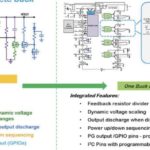 indie Semiconductor has launched a dual-channel USB Power Delivery (PD) IC that reduces component count, simplifies designs, and enhances the reliability of in-cabin vehicle charging systems for portable devices. Combining power conversion and control and supporting any configuration of USB Type A and Type C ports, the iND87300 is the automotive industry’s most integrated USB-PD firmware programmable controller.
indie Semiconductor has launched a dual-channel USB Power Delivery (PD) IC that reduces component count, simplifies designs, and enhances the reliability of in-cabin vehicle charging systems for portable devices. Combining power conversion and control and supporting any configuration of USB Type A and Type C ports, the iND87300 is the automotive industry’s most integrated USB-PD firmware programmable controller.
OEMs are focused on enhancing the in-cabin experience allowing drivers and passengers to safely connect and fast charge personal devices inside the vehicle. Automotive USB-based power delivery is rapidly evolving to support higher power charging requirements of products such as tablets and laptops with an increasing number of ports throughout the cabin. The iND87300 has been designed to meet these challenging system requirements through an ultra-small form factor with minimal components. Further, the iND87300 supports field upgradability to future-proof device interoperability and user experience utilizing indie’s firmware tools and global support.
The controller brings together, in a single, ultra-compact 8.8mm x 10mm QFN package, a buck-boost converter, Arm Cortex M0 core processor, 64kB Flash and 16kB SRAM memory, a 12-bit housekeeping Analog to Digital Converter (ADC), and a variety of system interfaces including UART, I2C, and LIN. A USB-PD PHY and firmware stack supports USB-C channel configuration and PD port control, while the on-board 32-bit MCU allows vendor-specific configurations, as well as field upgrades and over-the-air (OTA), updates that ensure future compatibility with new and emerging charging profiles and USB-PD protocols. Enabling system efficiency above 95%, this device can deliver up to 60W of output power per channel, a programmable output voltage between 3.3V and 21V and supports maximum currents up to 5A. Dedicated LED illumination drivers and general-purpose I/O round up the feature list.
The iND87300 is sampling now, qualified for AEC-Q100 Grade 1, and is fully compliant with USB BC1.2 and USB PD2.0/3.0 standards as well as a number of proprietary charging modes. It supported both a charging downstream port (CDP) and dedicated charging port (DCP) in addition to Apple and Samsung charging schemes. Direct connection to the vehicle power supply is made possible by the ability to withstand a 40V load dump from the vehicle battery and 24V tolerant pins that protect against shorts to VBAT and GND.







Leave a Reply